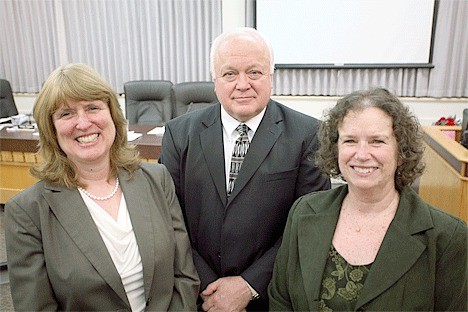In an effort to avoid any hang-ups during the Pioneer Way construction phase, slated for January 2011, the Oak Harbor City Council has opted to pay downtown property owners, provided they agree not to sue the city, for an easement to Pioneer Way.
The governing body also authorized the city to pursue a settlement called a “quiet title action,” to earn “paper rights” to the Pioneer Way sidewalk right-of-way. The city needs the property for the controversial road project, which will turn Pioneer Way into a one-way street.
The discussion and decision came as a surprise to downtown property owner Frank Scelzi, who did not attend the meeting.
“This is clearly another display of how the city has handled this situation from the beginning,” he said. “First they’re cramming this thing down our throats and then they don’t put it on the public agenda that they’re even going to discuss (litigation). … Yet it’s something that is decided.”
The item was listed on the April 20 City Council agenda as “Pioneer Way ROW Acquisition Authorization.”
The quiet title action will award downtown property owners $1,290 per parcel if they accept the city’s prescriptive easement on Pioneer Way without litigation. There are 31 parcels owned by 22 people, according to city documents.
The city consulted outside legal help, Bellingham-based lawyers Richard Langabeer and Christine Farnum, in March “because this needs to be done very quickly,” City Attorney Margery Hite said.
Without clear rights to the sidewalk, any downtown property owner could halt construction if sidewalk ownership comes into question. What’s not at question is the direction of traffic.
“Whether this is a one-way or two-way street, this issue needs to be resolved,” said City Engineer Eric Johnston.
Since March, Langabeer and his legal team have poured through every city document relating to Pioneer Way from 1968 forward. In order to settle the easements before construction, it’ll be necessary to file the quiet title action by May.
“We have historical evidence, clear historical evidence, that the sidewalks were in place by 1975 … as they exist now,” he said.
The city can’t pay for something it already owns; instead, said Langabeer, it can pay for the paper rights to an easement on the sidewalk slivers of property. The rights will entitle the city to make improvements to and maintain the downtown sidewalk. The documents will also hold the city legally responsible should an unkept section of sidewalk cause injury.
Councilman Bob Severns agreed that paper rights to the sidewalk easement are an important step to establish who’s liable for the sidewalks. For example, the property owner is currently liable for injuries that occur of their section of sidewalk, while the city is liable for accidents that occur on its section.
If Oak Harbor gets the paper rights to the sidewalk — from building to street — then it would be responsible for any accidents in those areas. The merchants and owners would be free of any responsibility, so it’ll be a benefit to them, he said.
“I’d really like to get them all in a room and sell that idea,” he said, adding “lawsuit” is such a crumby word.
Hite explained that the payment is based on “ballpark” court costs.
“The estimated costs of litigation are assumed to be $40,000 so the payment for making a trial unnecessary is $1,290 per parcel,” she said. “It saves them time and money and it saves the city time and money.”
Langabeer explained the need for quiet title as a way to define who owns the right to improve and maintain the downtown sidewalks.
“We believe the public owns the sidewalks, but you (the city) don’t have a paper title,” he said. “You formalize it by bringing a quiet title action.”
“From the 1970s forward, the sidewalks along Pioneer Way were created and maintained by the city,” Hite said. “However, there are no historical legal documents establishing the city’s ownership of the right-of-way for some of the sidewalk areas.”



